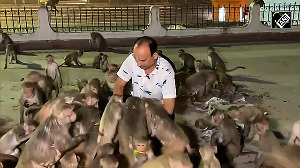Terming the new unified licence regime to be in the interest of the consumers, the Centre has informed the Supreme Court that tariff reduction in telecom services fuelled by competition was not to the liking of cellular operators.
| |||||||||||
Replying to a petition filed by Cellular Operators Association of India challenging WLL services, the government said, "Competition in telecom sector has greatly helped consumers. Tariffs have fallen from Rs 16 per minute to Re 1 per minute. Long distance tariffs have seen a reduction of more than 60 per cent."
"Obviously this is not to the liking of the cellular operators," the government said, adding, "Consumers cannot be allowed to be squeezed or blackmailed by any of the operators."
Accusing the cellular operators of being party to the consultation process before notification of the unified licence regime, the Centre said that they did not choose to challenge it during the stages of formulation and initiation.
It said, "The cellular operators having chosen to ignore developments and having not challenged the Telecom Regulatory Authority of India recommendations before the appropriate forum, cannot be permitted to use these proceedings to convert the Supreme Court into a primary tribunal examining the decisions on facts and beyond the scope of appellate jurisdiction under the Trai Act."
The government said the cellular operators did not pay any entry fee for migration to the new unified regime, while the basic operators have been charged a fee running into thousands of crores.
Accusing the cellular operators of opposing competition in the telecom sector, the government said the players have been granted concessions from time to time including migration from fixed licence fee regime to revenue sharing regime.
It cited the example of provisioning of short messaging service resulting in the wiping out of the radio paging industry, which got no compensation.
"The cellular operators have already accepted multi-player regime while accepting the post NTP-99 migration package in which unlimited number of players could be inducted by the government," the Centre's affidavit said.
Since the cellular operators had made commitments to the government while accepting the migration package to NTP-99 regime that additional licences without any limit could be issued in a service area, the unified licenece was consistent with contractual obligation of existing operators specially the cellular players, the government said.
As basic operators have paid additional fees to be at par with the cellular players, the latter could not now say that government was unfair in giving additional licences under the unified regime and claim status quo in the licencing.






